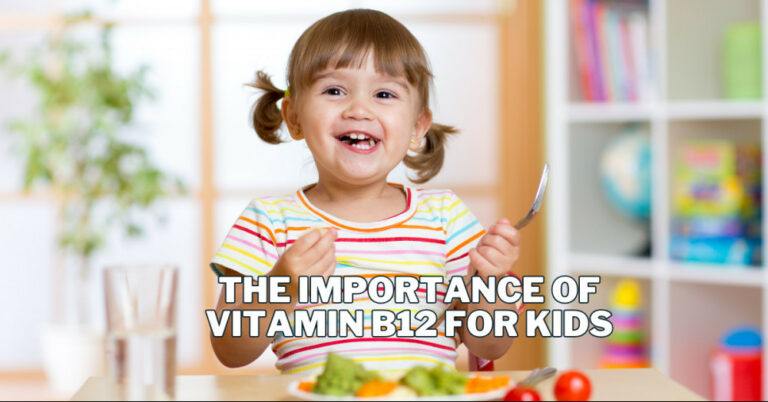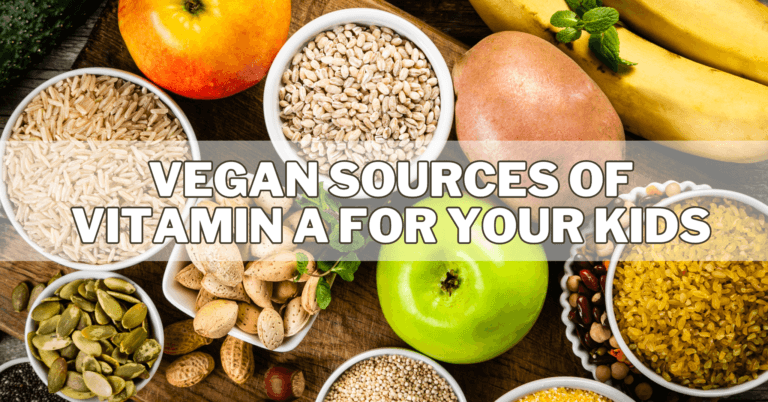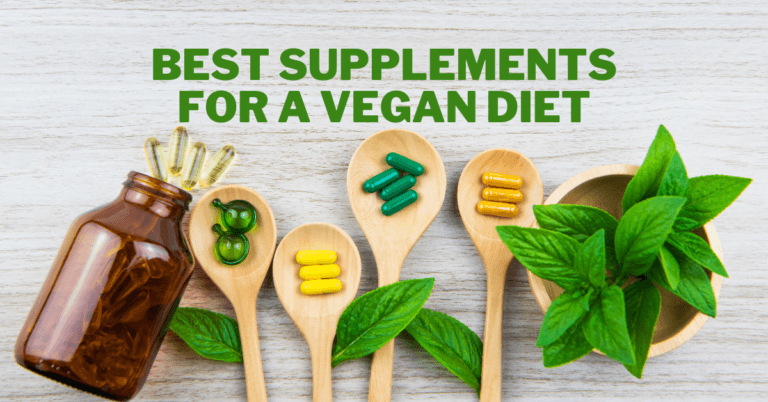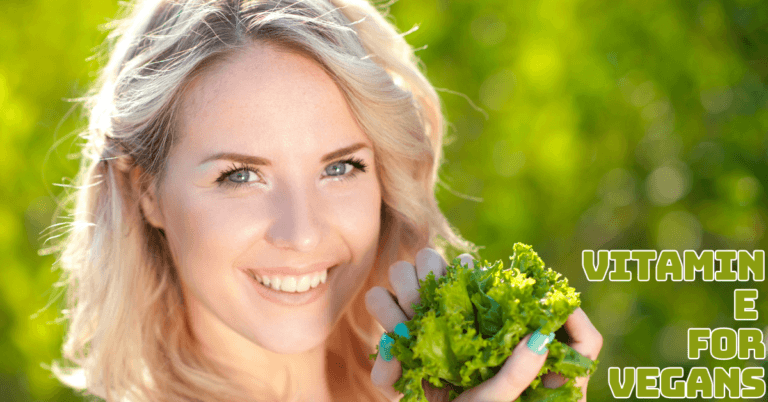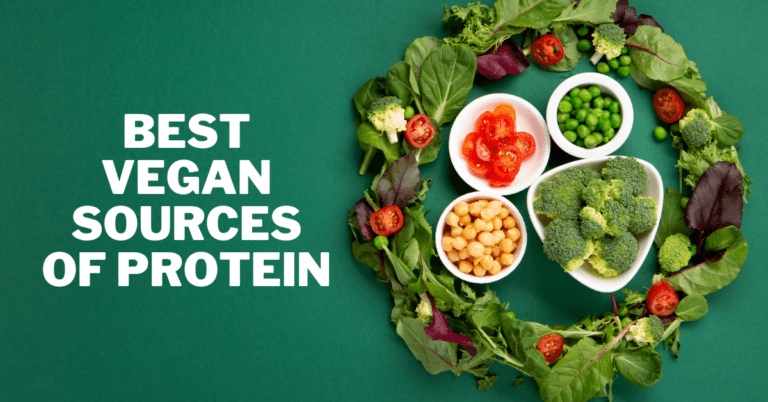Your Comprehensive Vegan Nutrition Guide
Your Comprehensive Vegan Nutrition Guide
Navigating the world of vegan nutrition opens the door to vibrant flavours, ethical choices, and healthful living. As more individuals embrace plant-based diets for environmental concerns, animal welfare, or personal well-being, understanding how to craft a balanced and nourishing vegan diet becomes paramount.
This comprehensive vegan nutrition guide is designed to illuminate the path toward informed decision-making. It offers insights into essential nutrients, optimal food choices, and practical strategies to meet your nutritional needs while savouring the rich tapestry of plant-based cuisine.
Whether you're a seasoned vegan or embark on an exploration journey, this guide is a trusted companion. It demystifies the complexities of vegan nutrition and empowers you to embark on a fulfilling and healthful dietary adventure.
From vibrant fruits and vegetables to protein-rich legumes, fortified foods, and mindful supplement choices, let's embark on a journey through vegan nutrition's diverse and delightful world.
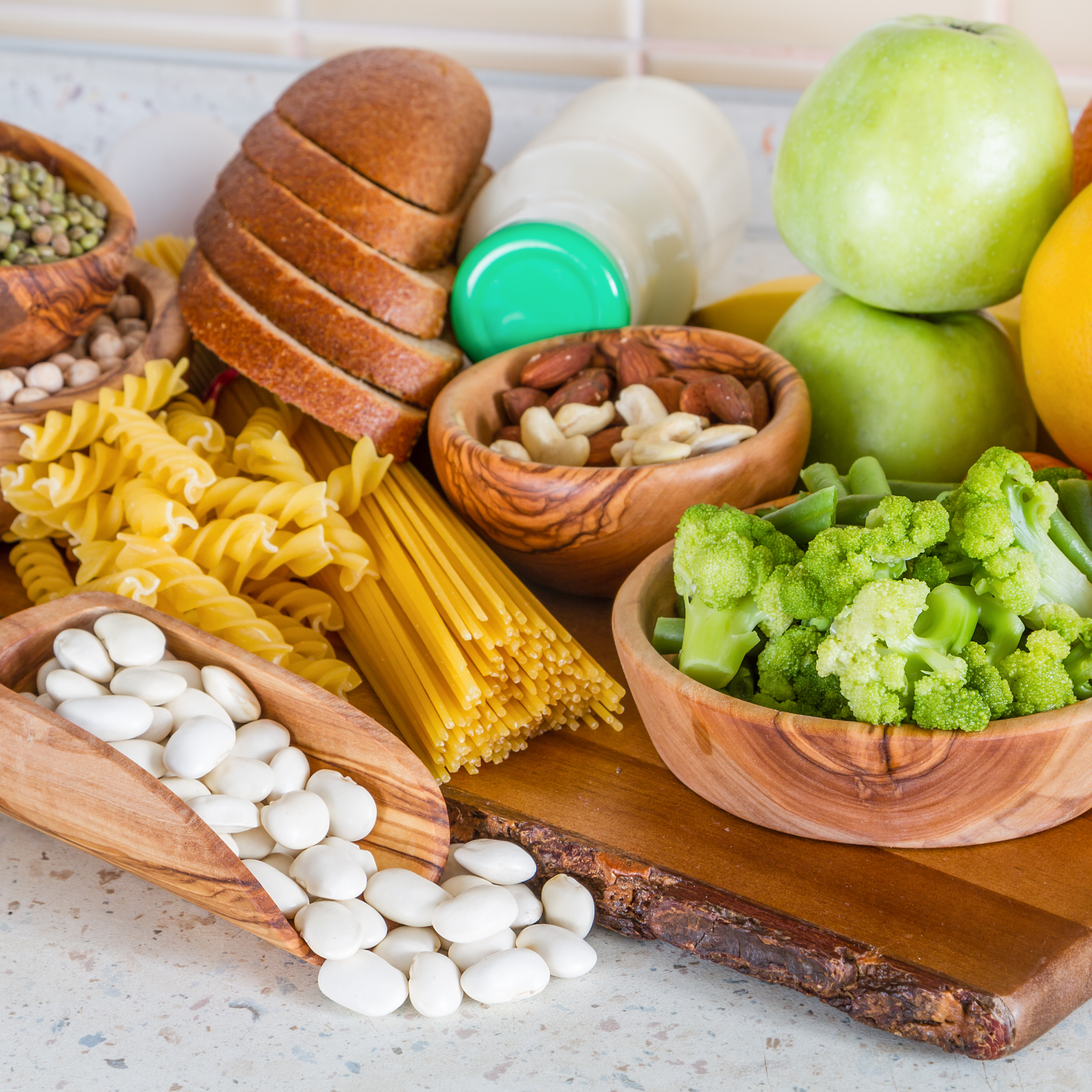
Essential Nutrients For Vegans
A robust understanding of essential nutrients is vital for anyone embarking on a vegan journey, as it lays the foundation for a well-rounded and nourishing plant-based diet.
These nutrients play multifaceted roles in supporting bodily functions, and as vegans, ensuring their adequate intake becomes a cornerstone of optimal health.
Protein often spotlighted in veganism discussions, is crucial for tissue repair, immune function, and muscle synthesis.
Plant-based protein sources, such as legumes, tofu, tempeh, seitan, nuts, and whole grains, offer an abundant supply, enabling vegans to meet their daily requirements and flourish in their active lives.
Iron, a mineral in oxygen transport and energy metabolism, deserves attention. Iron in plant foods (non-heme iron) may be less readily absorbed than in animal products.
Incorporating iron-rich sources like legumes, leafy greens, dried fruits, and fortified foods and pairing them with vitamin C-rich options can enhance absorption.
Calcium is renowned for its role in maintaining strong bones and teeth, and plant-based sources like dark leafy greens (e.g., kale, collard greens), fortified plant milk, almonds, and fortified orange juice present accessible avenues for vegans to meet their calcium needs.
Vitamin B12, often obtained through animal products, poses a unique consideration for vegans. This essential vitamin supports nerve function and red blood cell formation, and while fortified foods and supplements offer viable sources, vigilance is necessary to ensure adequate intake.
Omega-3 fatty acids, renowned for their heart-protective benefits, can be sourced from flaxseeds, chia seeds, walnuts, and algae-based supplements. These fats are pivotal for brain health and inflammation regulation.
Zinc, vital for immune function and wound healing, resides in plant-based sources such as legumes, nuts, seeds, and whole grains. Ensuring diverse food choices can contribute to meeting zinc requirements.
Understanding the significance of these nutrients, their roles in overall health, and the array of plant-based sources available empowers vegans to craft nutritionally sound meal plans.
By incorporating a spectrum of nutrient-rich foods into their diets, vegans can thrive, embracing a lifestyle that aligns with their values and promotes vitality.
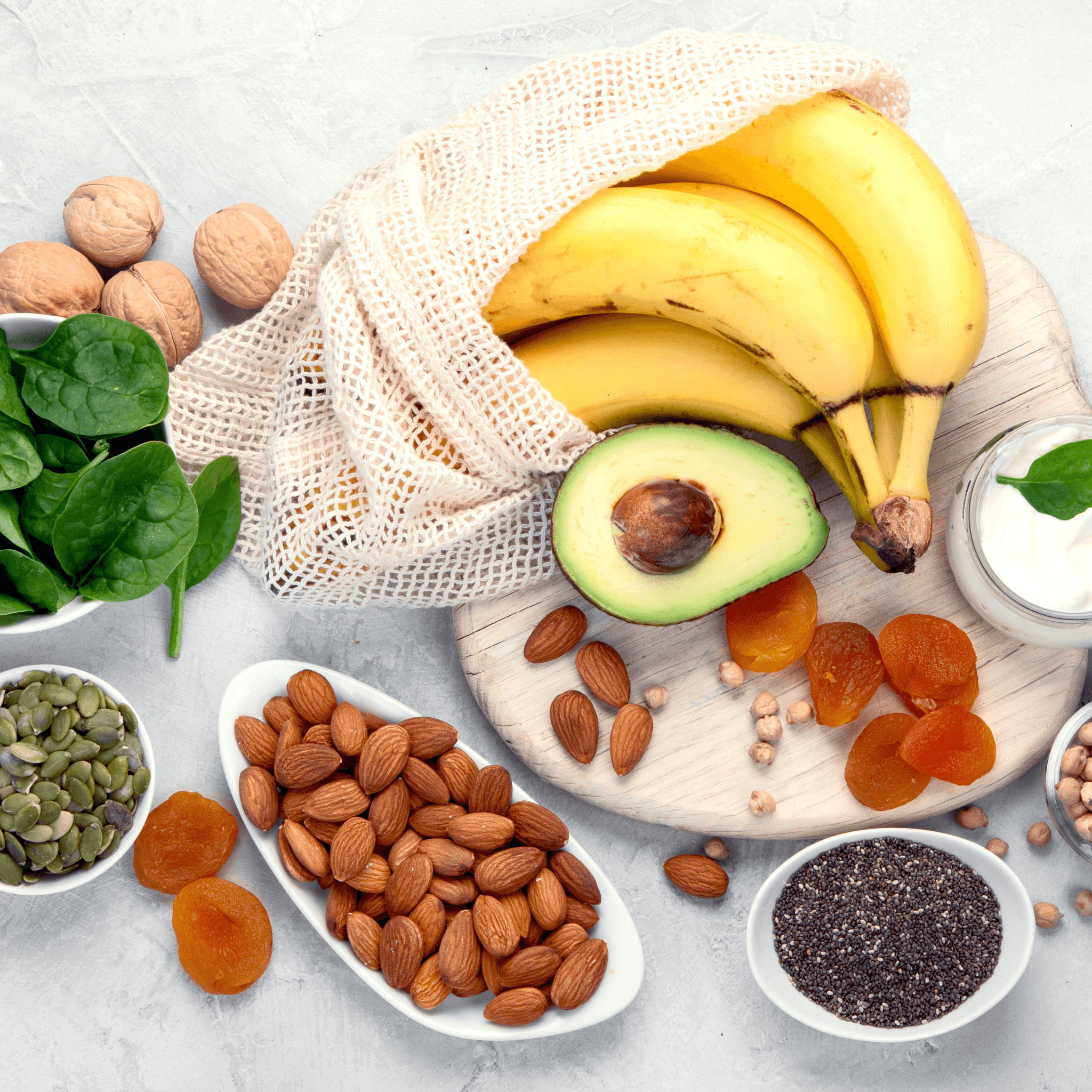
1. Balancing Macronutrients
Balancing macronutrients lies at the core of a successful and healthful vegan diet. It ensures that your body receives the right proportions of carbohydrates, proteins, and fats for sustained energy, optimal function, and overall well-being.
Carbohydrates
Carbohydrates, often considered the body's primary energy source, are abundant in plant-based foods like grains, legumes, fruits, and vegetables.
Opt for complex carbohydrates, such as quinoa, brown rice, and whole wheat bread, to steady energy release and promote satiety.
Plant-Based Proteins
Proteins, the building blocks of tissues and enzymes, can be sourced from various plant-based options. Add protein-rich legumes like lentils, chickpeas, tofu, tempeh, seitan, nuts, and seeds to your meals.
Combining various protein sources throughout the day ensures a comprehensive amino acid profile for maintaining and repairing biological structures.
Healthy Fats
Fats are often feared but vital for numerous bodily functions, and they can be obtained from healthy plant sources like avocados, nuts, seeds, and olive oil.
These fats support cell membrane structure, hormone production, and nutrient absorption. Aim for unsaturated fats and omega-3 fatty acids from flaxseeds and walnuts. Achieving balance involves mindful portioning and variety.
A typical day might begin with a breakfast of oatmeal topped with nuts and berries, providing carbohydrates, proteins, and healthy fats.
Lunch could feature quinoa and black bean salad with various vegetables, offering a complete macronutrient profile.
For dinner, consider stir-fried tofu with colourful veggies and brown rice, ensuring a balanced distribution of nutrients.
A sample breakfast meal plan could include a hearty smoothie with spinach, banana, chia seeds, and plant-based protein powder.
Lunch could consist of chickpea and vegetable stew served with whole grain bread. For dinner, lentil curry with brown rice and a side of mixed greens drizzled with olive oil. Snacks can include a handful of almonds or carrot sticks with hummus.
The key to crafting balanced meals is prioritizing whole, nutrient-dense foods and varying your choices across different food groups.
By heeding these principles, you satisfy your macronutrient needs and cultivate a palate that appreciates the spectrum of flavours, textures and benefits of a well-balanced vegan diet.
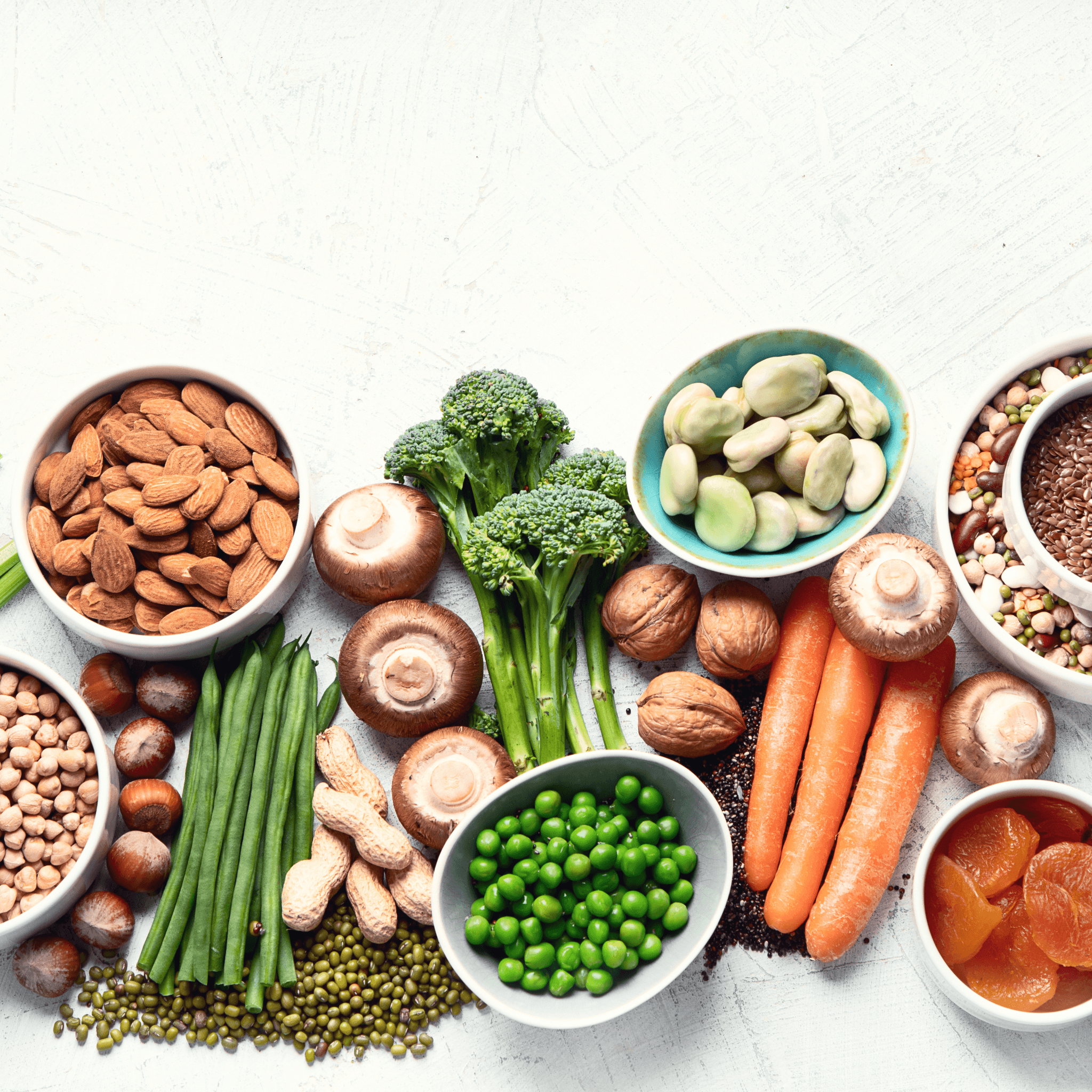
2. Plant-Based Protein Sources
Plant-based protein sources form the bedrock of a nourishing vegan diet, offering diverse options catering to taste preferences and nutritional needs.
Legumes, which encompass a wide array of beans, lentils, and peas, are among the cornerstones of plant-based protein.
These humble legumes have impressive protein content and ample dietary fiber, vitamins, and minerals.
Tofu, a versatile soy-based creation, takes center stage with its malleable texture and the ability to absorb flavours like a culinary chameleon.
Rich in protein and offering a complete amino acid profile, tofu's role in soups, stir-fries, and even desserts epitomizes the art of plant-based versatility.
Tempeh, a product of fermented soybeans, advances as a protein powerhouse fortified with probiotics. It lends gut health a helping hand while delivering a nutty, earthy flavour profile.
Seitan, derived from wheat gluten, offers a unique chewiness akin to meat. It is a high-protein canvas for various culinary creations.
Nuts and seeds, like almonds, walnuts, and chia seeds, embody an elegant blend of protein, healthy fats, and essential nutrients.
These tiny wonders contribute to protein intake, cardiovascular health, and satiety. Quinoa, a cherished pseudocereal, reigns as a complete protein source, flaunting all nine essential amino acids and a plethora of vitamins and minerals.
While the notion of “protein combining” once held sway, it is now understood that the body efficiently utilizes amino acids daily.
By enjoying various plant-based protein sources throughout meals and snacks, you naturally weave together a tapestry of amino acids, building complete protein profiles without requiring meticulous food pairing.
The synergy of these plant-based proteins ultimately grants you a palette of flavours, textures, and nutrients, empowering you to craft a well-balanced, protein-rich vegan diet that nourishes both body and soul.
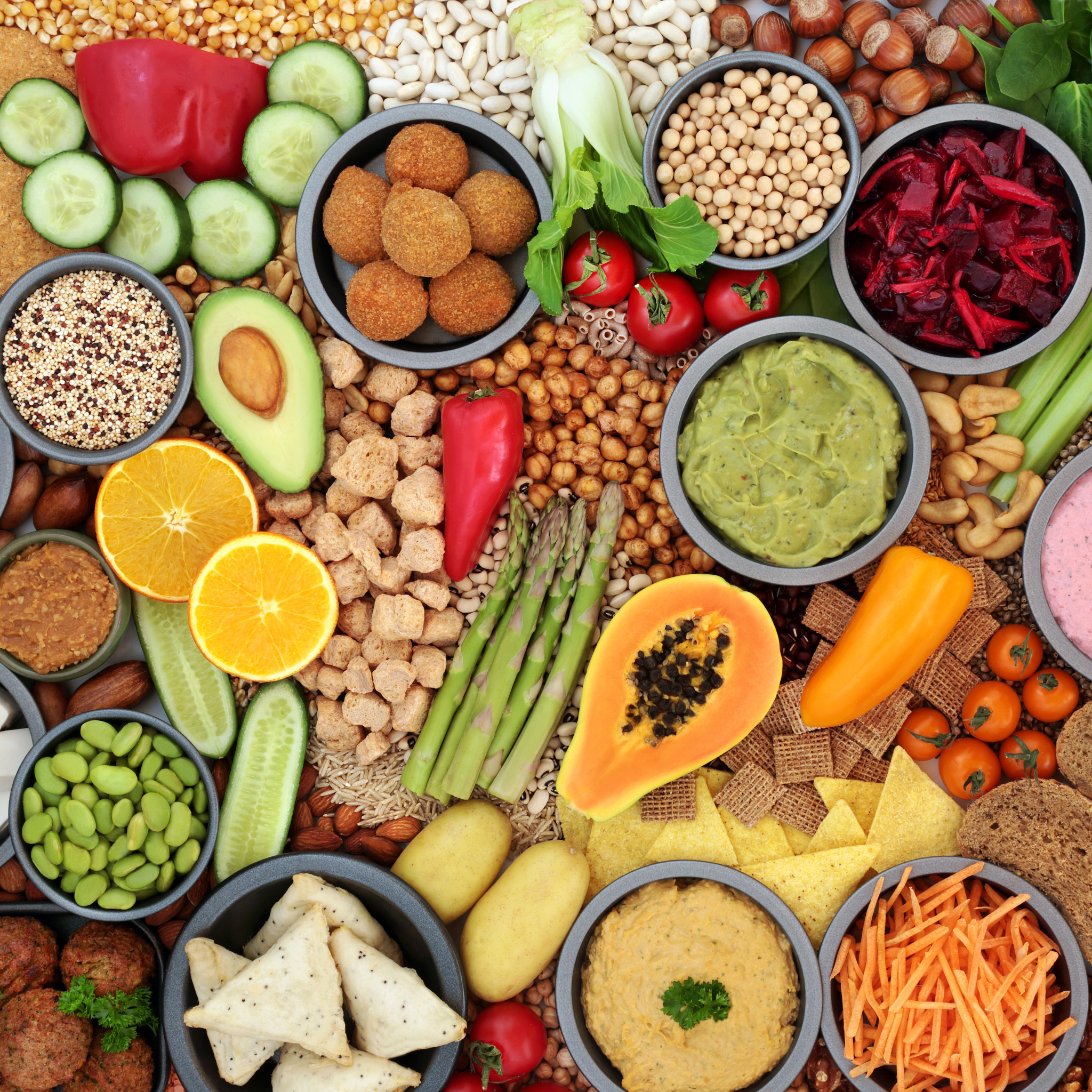
3. Iron-Rich Foods For Vegans
Iron, a mineral of paramount importance, finds its vegan stronghold in a spectrum of non-heme sources that hold their own nutritional value and culinary potential.
Legumes, encompassing beans, lentils, and chickpeas, emerge as iron-rich protagonists, boasting a symphony of protein, fiber, and essential minerals.
Leafy greens like spinach, kale, and Swiss chard ascend as verdant champions, offering a double punch of iron and vitamins.
However, their non-heme nature requires a strategic pairing with vitamin C-rich comrades to optimize absorption.
Dried fruits, including apricots, raisins, and figs, contain a concentrated iron bounty encapsulated in their natural sweetness.
These chewy delights are convenient snacks and potent allies in bolstering iron intake. Fortified foods, a modern marvel of nutritional innovation, bridge nutrient gaps with precision, ensuring vegans access to reliable iron sources like fortified cereals and plant milk.
To unlock the full potential of these non-heme iron sources, savvy pairing with vitamin C-rich foods becomes a cornerstone strategy.
Embracing the dynamic dance of iron and vitamin C, citrus fruits, bell peppers, and strawberries emerge as potent sidekicks, enhancing iron absorption through their role as facilitators.
Iron and vitamin C chemistry form a symbiotic relationship, culminating in an optimal absorption environment within the body.
In your quest for plant-based iron mastery, crafting a balanced plate marries iron-rich legumes with a colourful assortment of vegetables rich in vitamin C reaps the rewards.
Imagine a hearty lentil stew brimming with bell peppers or a kale salad generously garnished with strawberries. These culinary choices elevate both flavour and nutritional potential.
As you tread the path of iron-rich vegan nourishment, remember that knowledge is your compass, and strategic pairings are your map, guiding you toward a well-rounded and vibrant dietary journey.
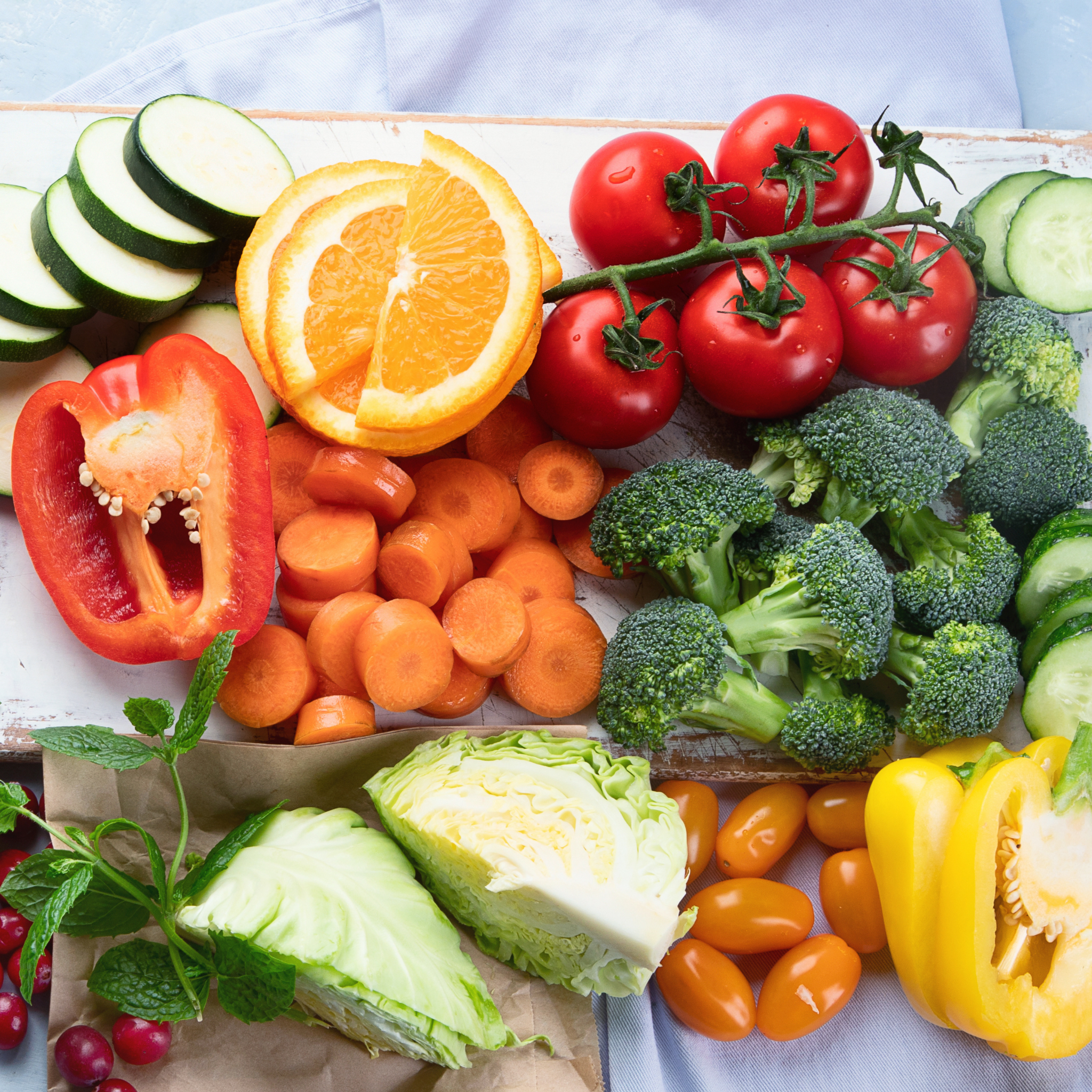
4. Vitamin B12 And Micronutrients In Vegan Nutrition
Vitamin B12, a formidable nutrient, takes center stage in vegan nutrition due to its unique role and the challenge of sourcing it exclusively from plant-based foods.
This water-soluble vitamin is vital for nerve function, DNA synthesis, and red blood cell formation, making its presence non-negotiable.
For vegans, acquiring sufficient vitamin B12 poses a problem, as plant foods need this nutrient naturally.
Hence, the prudent approach involves incorporating fortified foods such as plant-based milk, cereals, and nutritional yeast into your diet or opting for vitamin B12 supplements.
Regular blood tests can monitor your vitamin B12 status, ensuring optimal intake and overall well-being.
Beyond vitamin B12, a holistic approach to vegan micronutrient intake involves vigilance in procuring other essentials, including zinc and iodine.
Zinc, essential for immune function and metabolism, is found in legumes, nuts, seeds, and whole grains. Intentional selection and variety in these foods help meet zinc requirements.
Iodine, crucial for thyroid health and metabolism regulation, can be sourced from iodized salt, seaweed, and fortified foods.
Yet, due to varying iodine content in plant foods, judicious use of iodized salt and periodic attention to iodine levels is advised.
Furthermore, flaxseeds, chia seeds, and walnuts contain omega-3 fatty acids, which are pivotal for heart health and inflammation modulation.
At the same time, iron, which sustains oxygen transport and energy production, finds its vegan home in lentils, beans, fortified foods, and vitamin C-enhanced pairings.
A comprehensive view of micronutrients extends to calcium, a pillar of bone health, which can be obtained from fortified plant milk, dark leafy greens, tofu, and almonds.
Thus, a balanced tapestry of nutrient-rich foods, fortified options, and strategic supplement use fortifies the foundations of a thriving vegan lifestyle.

5. Fortified Foods And Supplements
Fortified foods and supplements serve as invaluable allies in the intricate tapestry of vegan nutrition, bolstering nutrient intake and bridging potential gaps that may arise from a plant-based diet.
Fortified plant milk, a prime example, is a versatile source of vital nutrients such as calcium, vitamin D, and vitamin B12.
These creamy elixirs, derived from almonds, soy, and oats, offer an accessible means to enhance bone health and ensure optimal nerve function.
Cereals, transformed into nutrient powerhouses through fortification, embark on a mission to deliver various vitamins and minerals, including iron, folic acid, and various B vitamins.
These fortified breakfast gems help meet daily nutrient quotas, infusing morning routines with convenience and an extra boost of healthfulness.
Nutritional yeast, an unsung hero of vegan cuisine, reigns as a flavour-packed vitamin B12 and protein source. Sprinkled onto dishes or incorporated into recipes, it lends a savoury, cheesy note while effortlessly contributing to essential nutrient intake.
While not a cornerstone of the vegan diet, supplements play a strategic role in safeguarding against potential deficiencies.
Vitamin B12, an elusive nutrient in plant-based foods, often necessitates a supplement regimen to maintain optimal health.
Regular vitamin D supplementation might also be required, particularly in regions with limited sunlight exposure. Omega-3 fatty acids, sourced from algae-based supplements, can bridge gaps in these heart-protective fats.
While the goal is to derive nutrients primarily from whole plant foods, supplements can serve as a prudent insurance policy, particularly for vitamins and minerals that might be challenging to obtain exclusively through diet.
Before embarking on a supplement regimen, consult a healthcare professional or registered dietitian to ensure that dosages are appropriate and aligned with individual needs.
The harmonious interplay between fortified foods and targeted supplements complements the vibrant symphony of vegan nutrition, enhancing both practicality and comprehensiveness in pursuing optimal well-being.
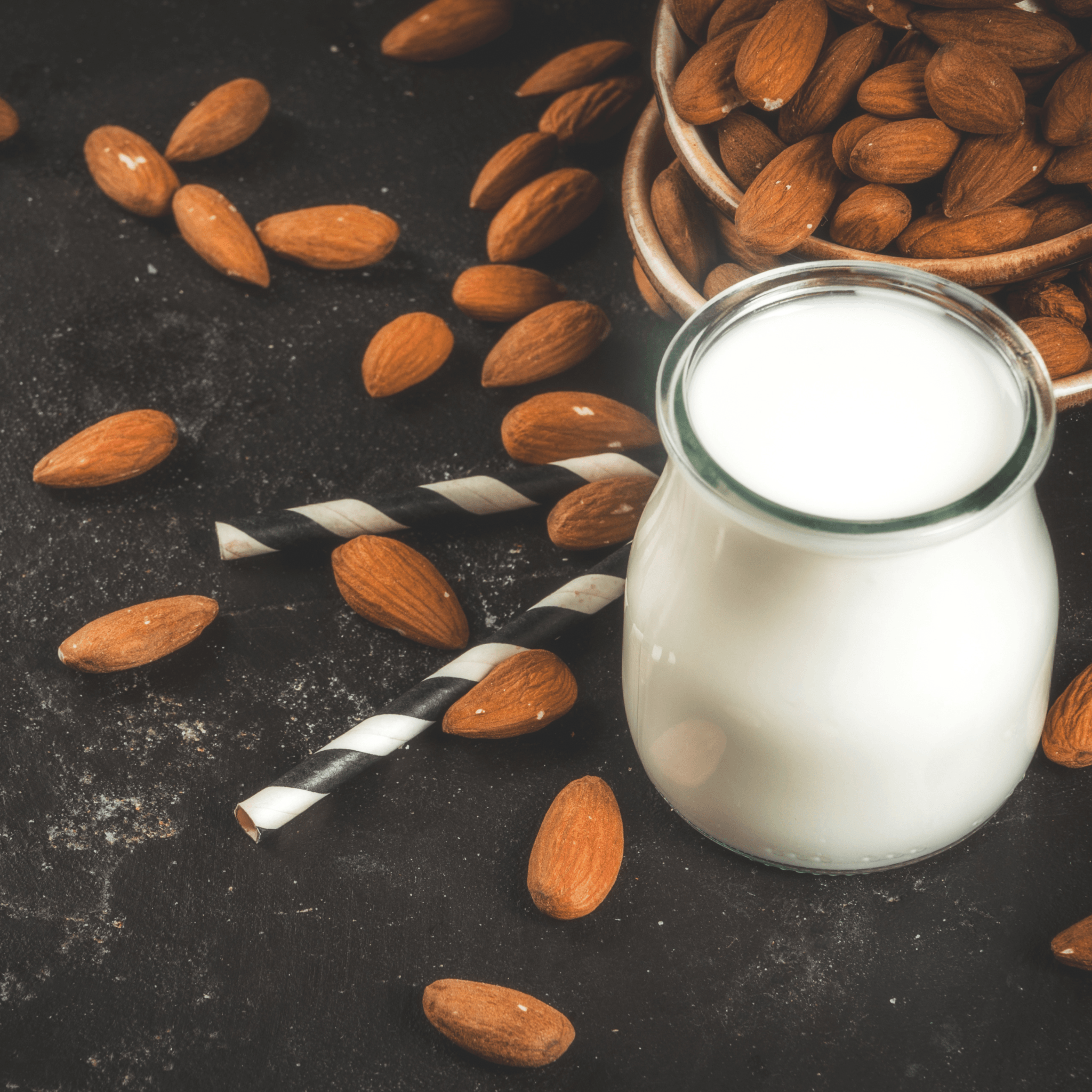
6. Calcium Sources And Bone Health For Vegans
Amidst vegan nutrition, calcium sources stand as sturdy pillars supporting the foundation of bone health and overall well-being.
Dark leafy greens, with their verdant allure, emerge as champions in the calcium arena. They deliver this essential mineral alongside a symphony of vitamins and minerals.
Fortified plant milk, fortified with calcium and often vitamin D, is a palatable and convenient way to bolster bone strength while harmonizing with various culinary creations.
Tofu, another plant-powered marvel, boasts a dual role: protein source and calcium haven. Silken or firm, it can be incorporated into diverse dishes, transcending breakfast scrambles, stir-fries, and decadent desserts.
Nuts, such as almonds and walnuts, contribute heart-healthy fats and protein and lend a dose of dietary calcium. These crunchy treasures grace savoury and sweet dishes, from salads to nut-based cheeses.
The significance of calcium in promoting strong bones and teeth is indomitable. Its roles extend beyond skeletal support to include muscle function, nerve transmission, and blood clotting.
Optimizing calcium absorption necessitates a dynamic dance with other nutrients. Ensuring sufficient vitamin D intake through sunlight exposure or supplementation amplifies calcium absorption.
Mindful pairing of calcium-rich foods with those high in vitamin K, like kale and broccoli, synergistically supports bone health.
Adequate protein intake from legumes and whole grains contributes to bone preservation. On the contrary, excessive salt and caffeine intake, often found in processed and caffeinated beverages, can impede calcium absorption and retention.
In pursuing robust bone health within veganism, weaving a tapestry of calcium-rich foods, strategic nutrient pairing, and judicious supplement use form a comprehensive strategy.
Harness the potential of these plant-based treasures to fortify not just your bones but your entire vitality, aligning your dietary choices with a flourishing and nourishing vegan lifestyle.
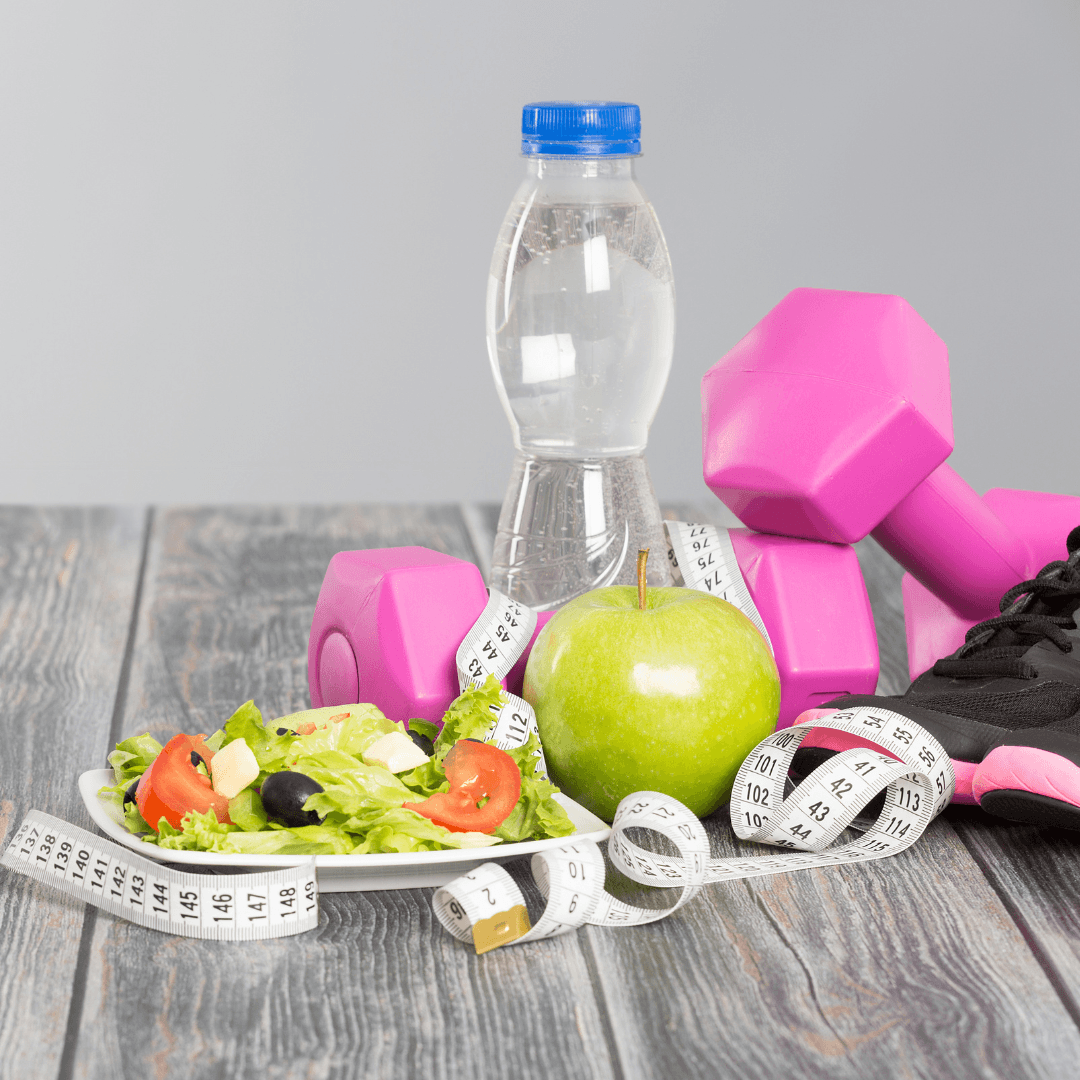
7. Vegan Athlete Nutrition
Navigating the terrain of vegan athlete nutrition is a dynamic journey, one that unites the tenets of plant-based nourishment with the heightened nutrient demands of rigorous physical activity.
For vegan athletes, meticulous attention to nutrient intake is paramount. Amplifying protein sources becomes a strategic art, harnessing legumes, tofu, tempeh, and seitan to ensure optimal muscle repair and growth.
Nutrient-dense whole grains like quinoa and brown rice furnish sustained energy, while healthy fats from nuts, seeds, and avocados fuel endurance and support joint health.
Crucially, mindful attention to micronutrients like iron, calcium, vitamin B12, and omega-3 fatty acids ensures peak performance.
Fortified foods, supplements, and a diverse array of plant sources work together to quell potential deficiencies.
Timely and adequate post-workout nutrition, featuring a blend of carbohydrates and proteins, aids muscle recovery and replenishes glycogen stores.
Hydration further enriches the synergy between training and nutrition, as staying adequately hydrated bolsters endurance, cognitive function, and body temperature regulation. Integrating electrolyte-rich foods and beverages, alongside ample water intake, hones in on fluid balance.
The role of carbohydrates, a primary energy source, cannot be understated. Tailoring carbohydrate intake to match the intensity and duration of workouts is pivotal for fueling performance.
Incorporating a variety of colourful fruits and vegetables yields antioxidant benefits, bolstering immune function and curbing exercise-induced oxidative stress.
A personalized approach takes precedence in the intricate dance of vegan athlete nutrition.
Regular consultations with registered dietitians or sports nutritionists, performance tracking and fine-tuning dietary strategies to meet unique needs.
By harmonizing the prowess of plant-based nourishment with strategic nutrient timing, diverse food choices, and holistic hydration, vegan athletes can unveil their full potential, triumphing in athletic feats and overall health and well-being.
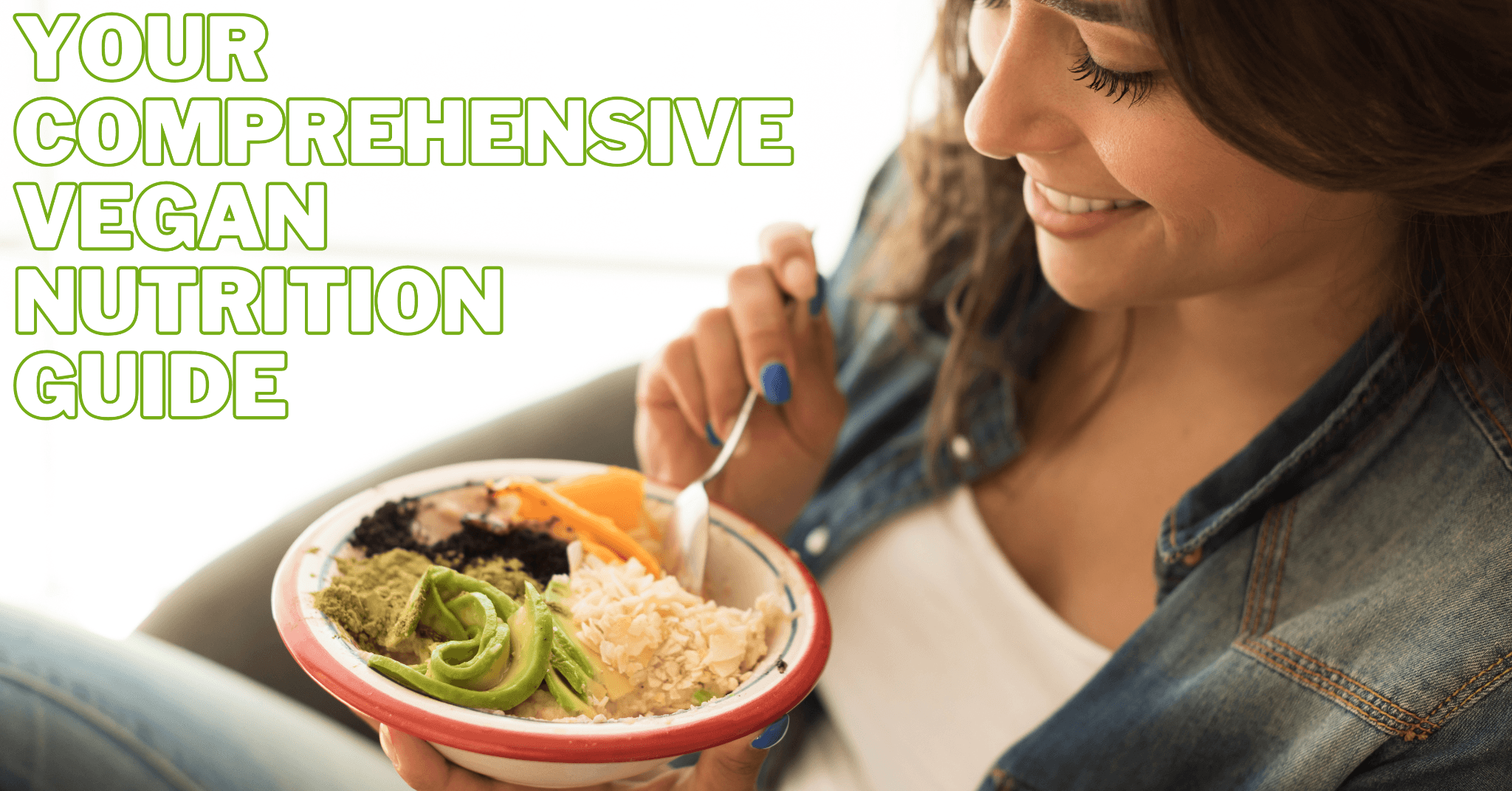
Conclusion
In the vibrant tapestry of vegan nutrition, the journey unfolds as a harmonious symphony of flavours, textures, and nourishing choices.
As we review this comprehensive vegan nutrition guide, it becomes evident that a well-planned vegan diet is not just a culinary preference but a powerful ally in promoting health, sustainability, and ethical considerations.
Yet, as with any dietary path, the key lies in informed choices, variety, and balance. A well-rounded vegan nutrition regime demands mindfulness and a willingness to explore new culinary horizons.
The vast plant-based landscape accommodates diverse tastes and cultural preferences while aligning with environmental and ethical values.
As you embark on your journey through this guide, remember that knowledge is your compass, and your choices ripple through your health, the planet, and the lives of fellow beings.
A thriving vegan lifestyle celebrates the potential to nourish yourself while honouring the interconnected web of life.
May this guide empower you to craft a nourishing, vibrant, and compassionate path forward as you embrace the kaleidoscope of flavours and nutrients that the world of vegan nutrition offers.
I trust you enjoyed reading the article about Your Comprehensive Vegan Nutrition Guide. Please stay tuned. I will be writing more blog posts very shortly.
JeannetteZ
>>>Please click here to read my Vegan Travel Guides To World Destinations<<<
>>>Want To Learn How To Create Delicious, Cruelty-Free, Healthy AND 100% Vegan Meals? Try These Awesome Vegan Cooking Courses With A Free 7-DAY MEMBERSHIP<<<
Your Opinion Is Important To Me
Do you have thoughts, ideas, or questions? I would love to hear from you. Please leave me your questions, experiences and remarks about Your Comprehensive Vegan Nutrition Guide in the comments section below. You can also email me at Jeannette@LivingTheVeganLifestyle.org.
>>>Please Click here to see what Wikipedia has to say about vegan nutrition<<<
Disclosure
This post may contain affiliate links. I earn from qualifying purchases as an Amazon Associate and other affiliate programs. Please read my full disclosure.
You might also enjoy these blog posts:
Why You Should Go Vegan – A Guide
Cruelty-Free Vegan Cosmetics – Love The Animals
The Definitive Guide To Vegan Fashion And Style
A Guide To The Best Vegan Accessories

